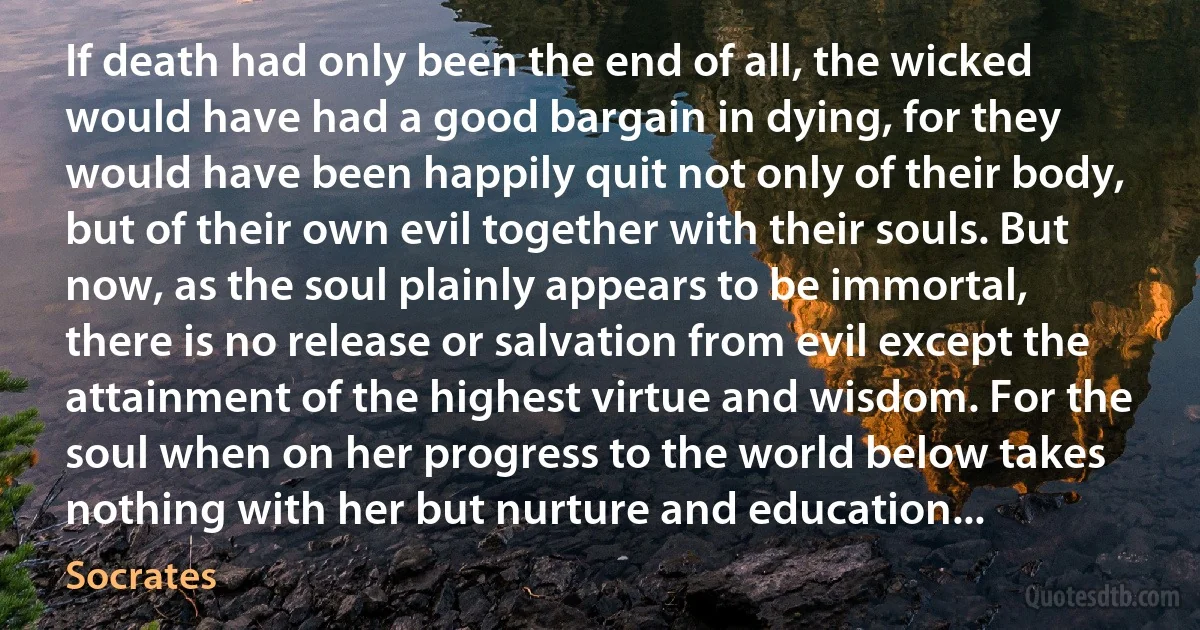Socrates quotes - page 8
When I left him, I reasoned thus with myself: I am wiser than this man, for neither of us appears to know anything great and good; but he fancies he knows something, although he knows nothing; whereas I, as I do not know anything, so I do not fancy I do. In this trifling particular, then, I appear to be wiser than he, because I do not fancy I know what I do not know.

Socrates
Now answer me this. Do you think that the same holds of horses? Do people in general improve them, whereas one particular person corrupts them or makes them worse? Or is it wholly the opposite: one particular person - or the very few who are horse trainers - is able to improve them, whereas the majority of people, if they have to do with horses and make use of them, make them worse? Isn't that true, Meletus, both of horses and of all other animals? Of course it is, whether you and Anytus say so or not. Indeed, our young people are surely in a very happy situation if only one person corrupts them, whereas all the rest benefit them.

Socrates
I shall never cease from the practice and teaching of philosophy, exhorting anyone whom I meet after my manner, and convincing him, saying: O my friend, why do you who are a citizen of the great and mighty and wise city of Athens, care so much about laying up the greatest amount of money and honor and reputation, and so little about wisdom and truth and the greatest improvement of the soul, which you never regard or heed at all? Are you not ashamed of this? And if the person with whom I am arguing says: Yes, but I do care: I do not depart or let him go at once; I interrogate and examine and cross-examine him, and if I think that he has no virtue, but only says that he has, I reproach him with overvaluing the greater, and undervaluing the less. ...For this is the command of God, as I would have you know...

Socrates
Now the compound or composite may be supposed to be naturally capable of being dissolved in like manner as being compounded; but that which is uncompounded, and that only, must be, if anything is, indissoluble. ...And the uncompounded may be assumed to be the same and unchanging, where the compound is always changing and never the same? ...Is that idea or essence, which in the dialectical process we define as essence of true existence-whether essence of equality, beauty, or anything else: are these essences, I say, liable at times to some degree of change? or are they each of them always what they are, having the same simple, self-existent and unchanging forms, and not admitting of variation at all, or in any way, or at any time?

Socrates
When the feeling of pleasure or pain in the soul is most intense, all of us naturally suppose that the object of this intense feeling is then plainest and truest; but this is not the case. ...because each pleasure and pain is a sort of nail which nails and rivets the soul to the body, and engrosses her and makes her believe that to be true which the body affirms to be true; and from agreeing with the body and having the same delights she is obliged to have the same habits and ways, and is not likely ever to be pure at her departure to the world below, but is always saturated with the body; so that she soon [after death] sinks into another body and there germinates and grows, and has therefore no part in the communion of the divine and pure and simple.

Socrates
As there are misanthropists, or haters of men, there are also misologists or haters of ideas, and both spring from the same cause, which is ignorance of the world. Misanthropy arises from too great confidence of inexperience; you trust a man and think him altogether true and good and faithful, and then in a little while he turns out to be false and knavish; and then another and another, and when this has happened several times to a man, especially within the circle of his most trusted friends, as he deems them, and he has often quarreled with them, he at last hates all men, and believes that no one has any good in him at all. ...The reason is that a man, having to deal with other men, has no knowledge of them; for if he had knowledge he would have known the true state of the case, that few are the good and few the evil, and that the great majority are in the interval between them.

Socrates
You would say... inexperienced as I am, and ready to start, as the proverb says, at my own shadow, I cannot afford to give up the sure ground of principle. ...and when you are further required to give an explanation of this principle, you would go on to assume a higher principle, and the best of the higher ones, until you found a resting place; but you would not refuse the principle and consequences in your reasoning like the Eristics-at least if you wanted to discover real existence.

Socrates
What is that the inherence of which, will render the body alive? [The soul. ] ...Then whatever the soul possesses, to that she comes bearing life? ...And is there an opposite to life? [Death. ] Then the soul, as she has been acknowledged, will never receive the opposite of what she brings. ...And what do we call the principle which does not admit of death? [The immortal. ] And does the soul admit of death? [No. ] Then the soul is immortal?

Socrates



